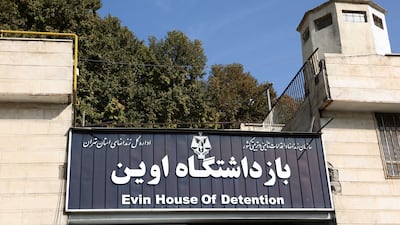Ten Iranian officials are among those placed under sanctions by Britain in the country’s biggest package brought against individuals, it was announced on Friday.
The UK imposed sanctions on 30 individuals from 11 countries, with a third of those facing sanctions are from the Tehran regime, with most connected to Tehran's notorious Evin prison and the revolutionary courts.
“Our sanctions go further to expose those behind the heinous violations of our most fundamental rights,” said James Cleverly, the Foreign Secretary.
Mr Cleverly summoned Iran's top diplomat in London on Friday to make a protest over the execution of Mohsen Shekari, a protester arrested in the current wave of anti-government demonstrations.
“We are committed to using every lever at our disposal to secure a future of freedom over fear,” said Mr Cleverly.
He approved the sanctions against the 10 senior Iranian figures “to ensure that violators of human rights are held to account”.
Two former directors of Evin prison, a “facility notorious for the mistreatment of Iranian and foreign detainees” the foreign office said, are named as Ali Cheharmahali, and Ghloamreza Ziyayi.
Allah Karam Azizi, a warden at the Razee Shahr prison, 20km west of Tehran, is also named.

A further six individuals linked to the revolutionary courts responsible for prosecuting protesters during the recent unrest in Iran, were placed under sanctions for imposing “egregious sentences”, which included the death penalty.
In a statement the Foreign Office said that the sanctions targeted “corrupt actors”, those “violating and abusing human rights” as well as “perpetrators of sexual violence in conflict”.
The package included people involved in a “wide range of grievous activities” involving the torture of prisoners, the mobilisation of troops to rape civilians and systematic atrocities.
A Russian officer named as Col Ramil Ibatullin was placed under sanctions for his alleged role as commander of the 90th Tank Division on the front line during the invasion of Ukraine.
Two Russian officers from the Federal Security Service in annexed Crimea were also named for the torture of Ukrainians in 2015.
Mian Abdul Haq, a Muslim cleric from Pakistan, was placed under sanctions for alleged forced conversions and marriages of girls from religious minorities.
Individuals in the Myanmar military junta and those allegedly responsible for human rights abuses in Nicaragua were also added to the list.
Commissioners accused of mobilising troops to rape civilians in South Sudan and a group said to be behind sexual violence in Mali were targeted as well.
The British government said that it was able to impose the broad range of sanctions as a result of “gaining new powers” since Brexit
Britain also placed sanctions on an additional five individuals for allegedly “lining their pockets through corruption and theft”.
They included Slobodan Tesic, “a significant arms dealer based in Serbia”, who has been accused of bribing a chief state prosecutor of another country.
“The UK will continue to use all levers at our disposal to tackle corrupt actors and morally reprehensible violations and abuses, including sexual violence, of human rights around the world,” the Foreign Office said.
The package ― which also marked International Anti-Corruption Day and Human Rights Day ― was co-ordinated with international partners.


